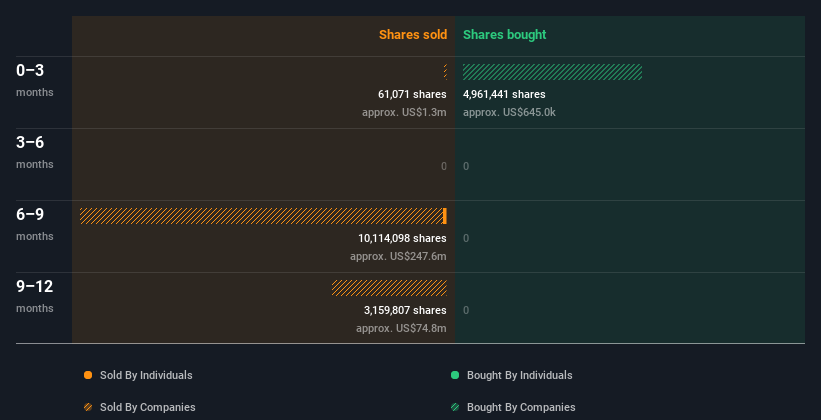- United States
- /
- Oil and Gas
- /
- NYSE:BTU
Possible Bearish Signals With Peabody Energy Insiders Disposing Stock

The fact that multiple Peabody Energy Corporation (NYSE:BTU) insiders offloaded a considerable amount of shares over the past year could have raised some eyebrows amongst investors. When analyzing insider transactions, it is usually more valuable to know whether insiders are buying versus knowing if they are selling, as the latter sends an ambiguous message. However, when multiple insiders sell stock over a specific duration, shareholders should take notice as that could possibly be a red flag.
While we would never suggest that investors should base their decisions solely on what the directors of a company have been doing, logic dictates you should pay some attention to whether insiders are buying or selling shares.
Check out our latest analysis for Peabody Energy
The Last 12 Months Of Insider Transactions At Peabody Energy
In the last twelve months, the biggest single sale by an insider was when the Executive VP & COO, Darren Yeates, sold US$815k worth of shares at a price of US$25.48 per share. While we don't usually like to see insider selling, it's more concerning if the sales take place at a lower price. The silver lining is that this sell-down took place above the latest price (US$22.03). So it may not tell us anything about how insiders feel about the current share price.
Insiders in Peabody Energy didn't buy any shares in the last year. You can see the insider transactions (by companies and individuals) over the last year depicted in the chart below. If you click on the chart, you can see all the individual transactions, including the share price, individual, and the date!

If you like to buy stocks that insiders are buying, rather than selling, then you might just love this free list of companies. (Hint: Most of them are flying under the radar).
Insider Ownership Of Peabody Energy
Another way to test the alignment between the leaders of a company and other shareholders is to look at how many shares they own. We usually like to see fairly high levels of insider ownership. Insiders own 0.4% of Peabody Energy shares, worth about US$9.9m, according to our data. Whilst better than nothing, we're not overly impressed by these holdings.
So What Do The Peabody Energy Insider Transactions Indicate?
It doesn't really mean much that no insider has traded Peabody Energy shares in the last quarter. The insider transactions at Peabody Energy are not inspiring us to buy. We also note that, as far as we can see, insider ownership is fairly low, compared to other companies. While it's good to be aware of what's going on with the insider's ownership and transactions, we make sure to also consider what risks are facing a stock before making any investment decision. To help with this, we've discovered 2 warning signs (1 is significant!) that you ought to be aware of before buying any shares in Peabody Energy.
But note: Peabody Energy may not be the best stock to buy. So take a peek at this free list of interesting companies with high ROE and low debt.
For the purposes of this article, insiders are those individuals who report their transactions to the relevant regulatory body. We currently account for open market transactions and private dispositions of direct interests only, but not derivative transactions or indirect interests.
New: Manage All Your Stock Portfolios in One Place
We've created the ultimate portfolio companion for stock investors, and it's free.
• Connect an unlimited number of Portfolios and see your total in one currency
• Be alerted to new Warning Signs or Risks via email or mobile
• Track the Fair Value of your stocks
Have feedback on this article? Concerned about the content? Get in touch with us directly. Alternatively, email editorial-team (at) simplywallst.com.
This article by Simply Wall St is general in nature. We provide commentary based on historical data and analyst forecasts only using an unbiased methodology and our articles are not intended to be financial advice. It does not constitute a recommendation to buy or sell any stock, and does not take account of your objectives, or your financial situation. We aim to bring you long-term focused analysis driven by fundamental data. Note that our analysis may not factor in the latest price-sensitive company announcements or qualitative material. Simply Wall St has no position in any stocks mentioned.
About NYSE:BTU
Very undervalued with flawless balance sheet.


